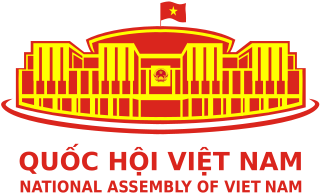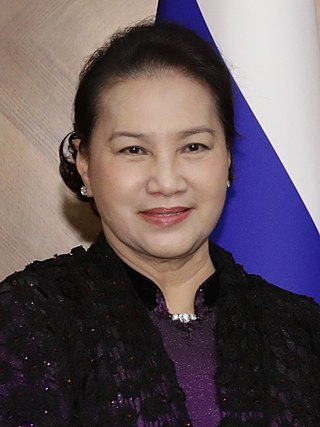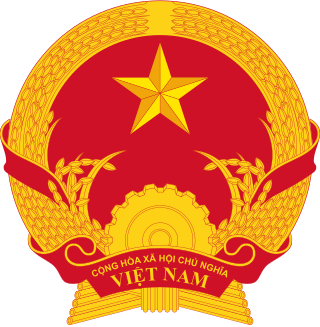This article has multiple issues. Please help improve it or discuss these issues on the talk page . (Learn how and when to remove these messages)
|
Before 1975 Trương Hòa Bình was nicknamed Nguyễn Văn Bình, also known as Sáu Đạt (Six Dat), native in Phuoc Vinh Dong, Can Giuoc, Long An province. [2]
His father Trương Văn Bang was a former Secretary of the Southern Party and Secretary of Saigon-Gia Dinh. He was considered to be one of the first regimental commanders of the revolutionary armed forces in South Vietnam, having participated in the robbery of the Saigon government. He was active in 1945 and in the beginning of the resistance war against the French in the East, which the South then called the Three Kingdoms.
His mother was Nguyễn Thị Nho (Nguyễn Thị Một) was a member of the Communist Party from 1935 to 1936 who had served as a member of the Can Giuoc District Commissioner, Standing Vice President of the Tay Ninh Provincial Party Committee. Eastern women. In 1955, she was assigned to Chief of the Southern Party Committee, when Lê Duẩn was Secretary of the Southern Party Committee. In 1959, she was imprisoned and tortured by the South Vietnamese Secret Service, but she remained faithful and loyal to the Community Party. Later, she joined and became a member of the Long An Provincial Assembly.
Related Research Articles

Nguyễn Thị Bình, also known as Madame Bình, is a South Vietnamese revolutionary leader, diplomat and politician. She became internationally known for her role as the Viet Cong (NLF)'s chief diplomat and leading its delegation to the Paris Peace Conference. The only woman among the signatories of the 1973 peace accords that ended American intervention in the Vietnam War, she later served in the government of reunified Vietnam after the Fall of Saigon and later became the country's Vice President in 1992. She is the first woman in Vietnamese history to be appointed a cabinet minister.

The National Assembly of the Socialist Republic of Vietnam is the unicameral parliament and the highest body of state power of Vietnam. The National Assembly is the only branch of government in Vietnam and, in accordance with the principle of unified power, all state organs are subservient to it.

Nguyễn Minh Triết is a Vietnamese politician who served as the seventh President of Vietnam from 2006 to 2011. He was elected by the National Assembly of Vietnam with 464 votes (94%) in June 2006.

Cần Đước is a rural district (huyện) of Long An province in the Mekong River Delta region of Vietnam. Cần Đước is located in the south of Long An. As of 2019 the district had a population of 187,359. The district covers an area of 218.20 km2. The district capital lies at Cần Đước.

The 11th Central Committee of the Communist Party of Vietnam was elected at the 11th National Congress of the Communist Party of Vietnam. The 11th Central Committee elected the 11th Politburo and the 11th Secretariat.

Nguyễn Thị Kim Ngân is a Vietnamese economist and politician. She is the first woman in Vietnamese history to head the country's legislature, serving as the eleventh Chair of the National Assembly of Vietnam from 2016 to 2021. She was a member of the 12th Politburo of the Communist Party, the country's highest decision-making body, in which she ranked second after General Secretary Nguyễn Phú Trọng.

The Six Provinces of Southern Vietnam is a historical name for the region of Southern Vietnam, which is referred to in French as Basse-Cochinchine. The region was politically defined and established after the inauguration of the Nguyễn dynasty, and called by this name from 1832, when Emperor Minh Mạng introduced administrative reforms, to 1867, which culminated in the eight-year French campaign to conquer the Six Provinces.

On 27 January 2016, the 12th National Congress elected 180 individuals to serve as members of the 12th Central Committee of the Communist Party of Vietnam (CPV) for the electoral term 2016–2021. The Central Committee is the highest decision-making institution in the CPV and Vietnam when the Party's National Congress and the Politburo are adjourned. In between congresses, the Central Committee is responsible for organising and directing the implementation of the Party's Political Platform, Charter, and resolutions adopted at the National Congress. Furthermore, it adopts guidelines and policies in all relevant fields, domestic or foreign. In addition, the sitting Central Committee is responsible for convening the next National Congress. Members of the Central Committee have the right to elect and remove the General Secretary of the Central Committee as well as members of the Politburo, the Secretariat and the Central Inspection Commission (CIC). When the Central Committee is not in session, it delegates its powers to these three elected organs which then report on their activities the next time the Central Committee convenes for a meeting. Central Committee members are responsible to and report on their work to the Central Committee.

The 10th Central Committee of the Communist Party of Vietnam was elected at the 10th National Congress of the Communist Party of Vietnam. The 10th Central Committee elected the 10th Politburo and the 10th Secretariat.

The 9th Central Committee of the Communist Party of Vietnam was elected at the 9th National Congress of the Communist Party of Vietnam. It elected the 9th Politburo and the 9th Secretariat.

The 13th Politburo of the Communist Party of Vietnam (CPV), formally the 13th Political Bureau of the Central Committee of the Communist Party of Vietnam (Vietnamese: Bộ Chính trị Ban Chấp hành trung ương Đảng Cộng sản Việt Nam Khoá XIII), was elected at the 1st Plenary Session of the 13th Central Committee (CC) in the immediate aftermath of the 13th National Congress. Nguyễn Phú Trọng was re-elected for his third term as General Secretary of the Communist Party of Vietnam, a position he has held since 2011.

The government of the Nguyễn dynasty, officially the Southern dynasty and commonly referred to as the Huế Court, centred around the emperor as the absolute monarch, surrounded by various imperial agencies and ministries which stayed under the emperor's presidency. Following the signing of the Patenôtre Treaty the French took over a lot of control and while the government of the Nguyễn dynasty still nominally ruled the French protectorates of Annam and Tonkin, in reality the French maintained control over these territories and the Nguyễn government became subsidiary to the administration of French Indochina. During World War II the Japanese launched a coup d'état ousting the French and establishing the Empire of Vietnam which was ruled by the Nguyễn government. During the August Revolution the Nguyễn government was abolished in the aftermath of World War II.

The 13th Central Committee of the Communist Party of Vietnam (CPV) has been in session since the conclusion of the 13th National Congress in 2021. It elected, at its 1st Plenary Session, the Politburo, about half of the membership of the Secretariat and the Central Inspection Commission of the 13th term.

The 7th Central Committee of the Communist Party of Vietnam (CPV) was elected at the 7th CPV National Congress. It elected the 7th Politburo and the 7th Secretariat.

The 6th Central Committee of the Communist Party of Vietnam (CPV) was elected at the 6th CPV National Congress. It elected the 6th Politburo and the 6th Secretariat.

The 5th Central Committee of the Communist Party of Vietnam (CPV) was elected at the 5th CPV National Congress. It elected the 5th Politburo and the 5th Secretariat.

The 4th Central Committee of the Communist Party of Vietnam (CPV) was elected at the 4th CPV National Congress. It elected the 4th Politburo and the 4th Secretariat.

The 13th Secretariat of the Communist Party of Vietnam (CPV), formally the 13th Secretariat of the Central Committee of the Communist Party of Vietnam (Vietnamese: Ban Bí thư Ban Chấp hành Trung ương Đảng Cộng sản Việt Nam Khoá XIII), was partly elected by the 1st Session of the 13th Politburo and partly elected by the 1st Plenary Session of the 13th Central Committee in the immediate aftermath of the 13th National Congress. Nguyễn Phú Trọng was re-elected for his third term as General Secretary of the Communist Party of Vietnam, a position he has held since 2011.
The 12th Secretariat of the Communist Party of Vietnam (CPV), formally the 12th Secretariat of the Central Committee of the Communist Party of Vietnam (Vietnamese: Ban Bí thư Ban Chấp hành Trung ương Đảng Cộng sản Việt Nam Khoá XII), was partly elected by a decision of the 12th Politburo and partly elected by the 1st Plenary Session of the 12th Central Committee (CC) in the immediate aftermath of the 12th National Congress.
The 11th Secretariat of the Communist Party of Vietnam (CPV), formally the 11th Secretariat of the Central Committee of the Communist Party of Vietnam (Vietnamese: Ban Bí thư Ban Chấp hành Trung ương Đảng Cộng sản Việt Nam Khoá XI), was partly elected by a decision of the 11th Politburo and partly elected by the 1st Plenary Session of the 11th Central Committee (CC) in the immediate aftermath of the 11th National Congress.
References
- ↑ "Lãnh đạo Tòa án nhân dân tối cao đương nhiệm". The Supreme People's Court of Vietnam. Retrieved 9 July 2014.
- ↑ "Tiễn đồng chí Nguyễn Thị Một về nơi an nghỉ". Báo Sài Gòn Giải Phóng. 2013-04-20. Retrieved 2017-11-11.
Trương Hòa Bình | |
|---|---|
 | |
| Permanent Deputy Prime Minister of Vietnam | |
| In office 9 April 2016 –28 July 2021 | |
| Preceded by | Nguyễn Văn Hiện |
| Succeeded by | Nguyễn Hòa Bình |